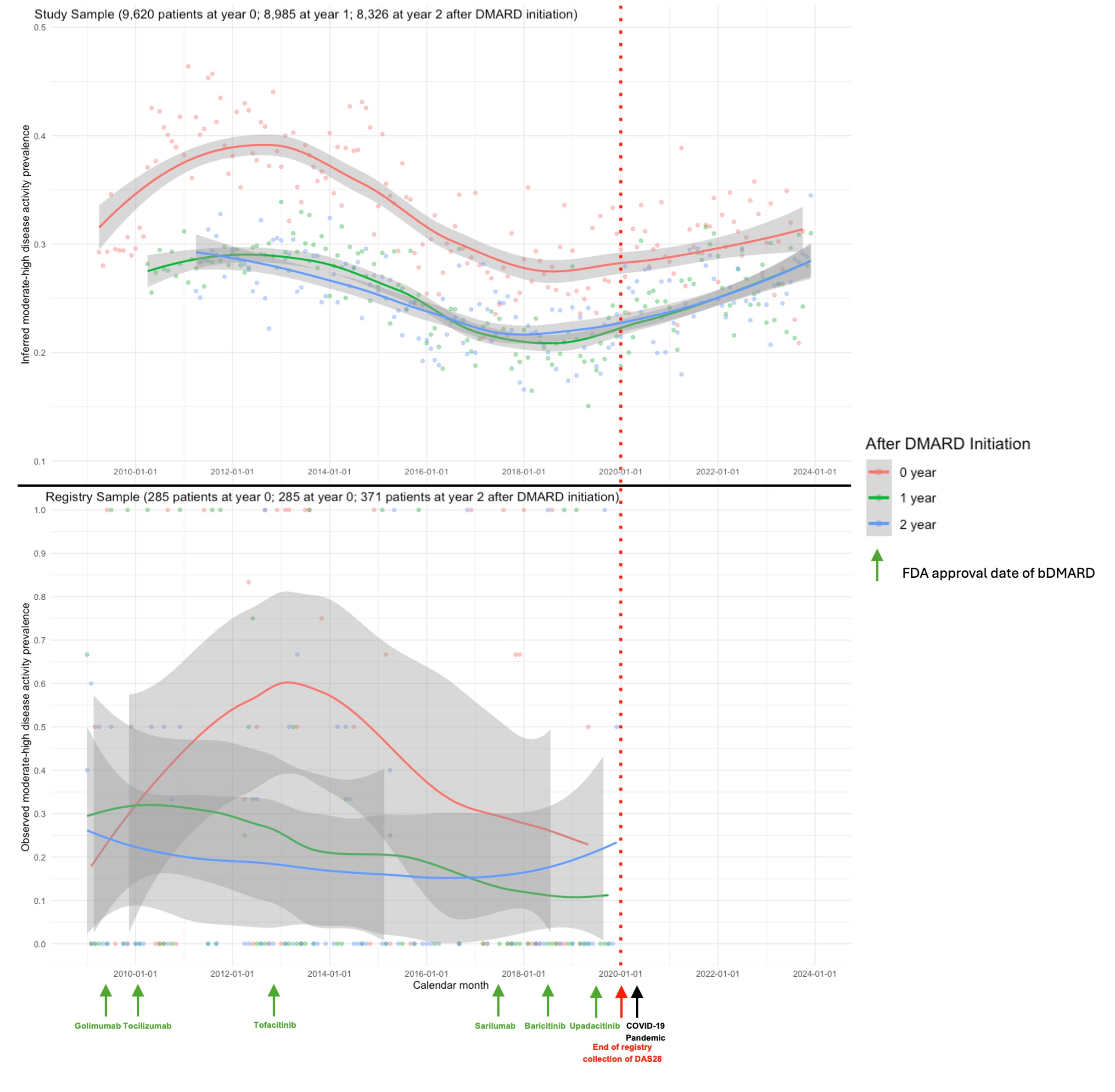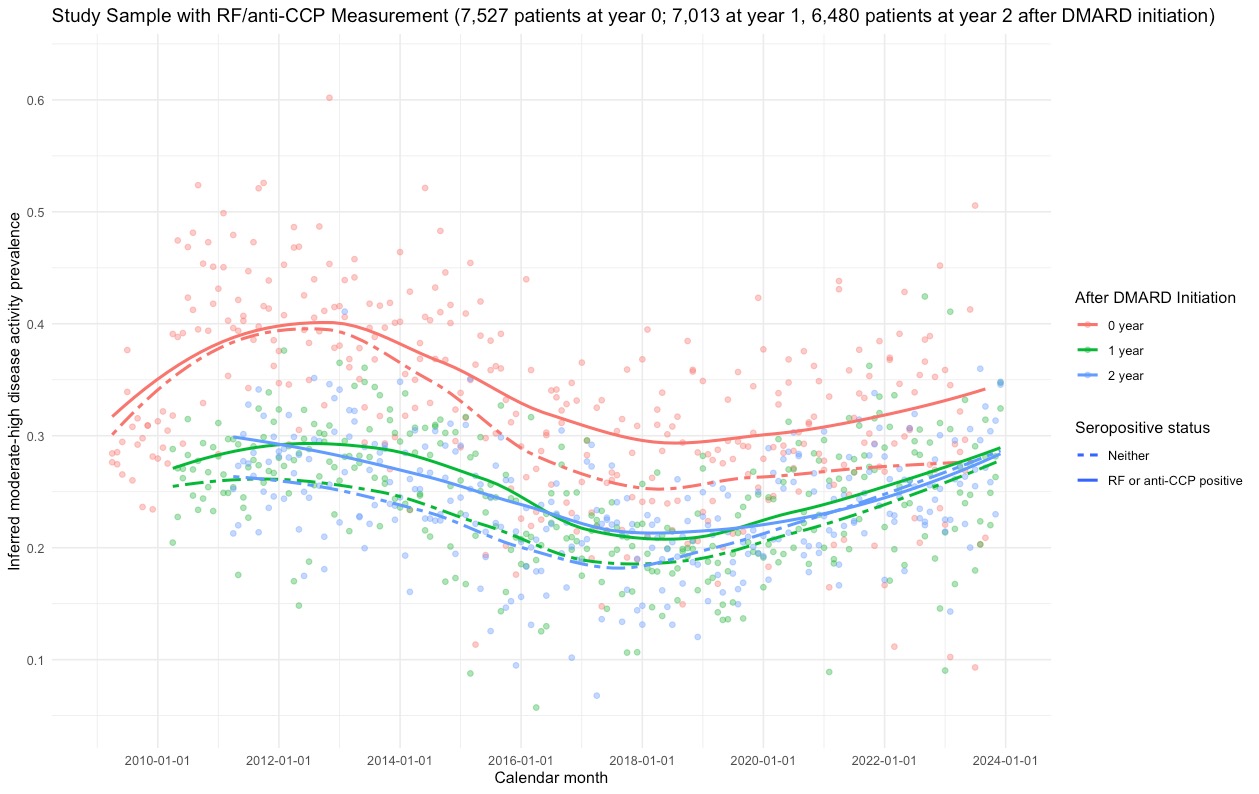Session Information
Session Type: Abstract Session
Session Time: 3:00PM-4:30PM
Background/Purpose: Systematic measurement and documentation of disease activity in RA patients is key for monitoring quality of care and is an important outcome and predictor in clinical studies. In the US, standardized disease activity measures are not routinely collected in clinical care but are collected in registry studies. In a prior study, we developed an algorithm to infer patient-level RA disease activity using electronic health records (EHR) data. This study aimed to examine overall trends in disease activity in a large EHR-based RA population using DAS28 inferred by the algorithm alongside trends in a registry study where DAS28 was collected from in-person visits.
Methods: We identified RA patients who initiated a DMARD over 2009-2023 using EHR data from two large academic medical centers. Previously we trained a neural network model to infer moderate-high disease activity (DAS28-CRP ≥3.2) for a patient at a given time using structured EHR data (e.g., ICD codes) and concepts extracted from notes via natural language processing (e.g., mentions of “synovitis”). DAS28-CRP from the registry was used as the gold-standard outcome for training. This algorithm was applied to the RA EHR patients to estimate the monthly prevalence of moderate-high disease activity at DMARD initiation (1st DMARD prescription after 1st RA ICD code) and 1 and 2 years after initiation. Local polynomial regression was used to estimate trends in prevalence over calendar time. We repeated this analysis for patients enrolled in the registry and calculated the prevalence using DAS28-CRP collected from the registry. We stratified the analysis in the RA EHR patients by seropositivity status (RF or anti-CCP positive), among those who had either of these labs checked.
Results: The EHR RA population included 9,620 RA patients who initiated a DMARD, while there were 285 registry patients. The mean age of the EHR population at DMARD initiation was 65 years, 78% female, 81% White. The trends in inferred prevalence of moderate-high disease activity ranged between 28-39% at DMARD initiation but decreased to 21-29% at 1 year and 2 years after initiation. The prevalence of moderate-high disease activity decreased over 2013-2019 but increased in 2020-2023. Similar trends were observed among the registry patients using DAS28-CRP collected from the registry. Among the smaller group of registry patients, we observed more extreme changes in trends with wider confidence intervals. In the stratified analysis, seropositive patients exhibited a higher prevalence of moderate-high disease activity than seronegative patients in earlier years. However, disease activity levels at 1 and 2 years after DMARD initiation converged between seropositive and negative patients in recent years, despite differences at initiation.
Conclusion: The overall pattern of trends based on disease activity inferred from EHR data was similar to trends based on manually collected disease activity, demonstrating face validity. Trends among the large EHR population suggest that disease activity levels have increased in recent years since the COVID-19 pandemic and that disease activity after treatment may be converging between seropositive and seronegative patients.
To cite this abstract in AMA style:
Cheng D, Panickan V, Cagan A, McDermott G, Jeffway M, Qi Y, Liu F, Weinblatt M, Shadick N, Cai T, Liao K. Trends in Disease Activity in Rheumatoid Arthritis over 2009-2023 Utilizing DAS28-CRP Inferred from Electronic Health Records [abstract]. Arthritis Rheumatol. 2024; 76 (suppl 9). https://acrabstracts.org/abstract/trends-in-disease-activity-in-rheumatoid-arthritis-over-2009-2023-utilizing-das28-crp-inferred-from-electronic-health-records/. Accessed .« Back to ACR Convergence 2024
ACR Meeting Abstracts - https://acrabstracts.org/abstract/trends-in-disease-activity-in-rheumatoid-arthritis-over-2009-2023-utilizing-das28-crp-inferred-from-electronic-health-records/


